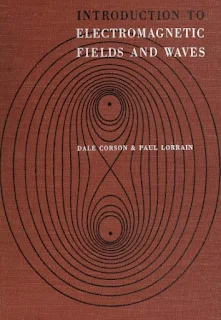 |
| Introduction to Electromagnetic Fields and Waves by Paul Lorrain Dale R. Carson |
DESCRIPTION:
"Introduction to Electromagnetic Fields and Waves" by Paul Lorrain
and Dale R. Carson is a comprehensive textbook that serves as an invaluable
resource for students and professionals delving into the intricate world of
electromagnetism. Published by John Wiley & Sons, this seminal work is
widely recognized for its clear and systematic approach to the fundamental
principles of electromagnetic fields and waves.
The
book is structured in a way that facilitates a gradual and logical progression
through the complexities of electromagnetic theory. It begins with the
foundational concepts, laying the groundwork for a deep understanding of the
subject matter. As the authors navigate through the intricacies of
electromagnetic fields and waves, they seamlessly blend theoretical
explanations with practical applications, making the material accessible and
engaging for readers.
One of
the distinctive features of Lorrain and Carson's approach is their emphasis on
the physical intuition behind the mathematical formalism. The authors recognize
that electromagnetism can be a challenging subject, and they skillfully bridge
the gap between theory and application by providing insightful explanations and
real-world examples. This approach not only aids in comprehension but also
instills a profound appreciation for the beauty and utility of electromagnetic
theory.
The
first chapters of the book delve into the foundational concepts of vectors,
coordinate systems, and basic mathematical tools essential for the study of
electromagnetism. This careful introduction ensures that readers have the
necessary mathematical background to tackle the more advanced topics covered
later in the text. Moreover, the authors provide a concise review of classical
physics, including Newtonian mechanics and thermodynamics, to establish a solid
foundation for the electromagnetic principles introduced subsequently.
The
heart of the book lies in its exploration of Maxwell's equations — the
cornerstone of classical electromagnetism. Lorrain and Carson guide readers
through these equations with clarity and precision, emphasizing the physical
significance of each term. The authors elucidate the intricate interplay
between electric and magnetic fields, demonstrating how these phenomena are
intertwined in the propagation of electromagnetic waves.
A
standout feature of the book is its treatment of electromagnetic waves. The
authors offer a comprehensive examination of wave propagation, covering topics
such as wave equations, plane waves, and wave polarization. Through a series of
thoughtfully designed examples and exercises, readers gain a deep understanding
of the principles governing the behavior of electromagnetic waves in different
media.
The
practical applications of electromagnetic theory are highlighted throughout the
text, illustrating the wide-ranging impact of these principles on technology
and everyday life. The book explores the transmission lines and waveguides
crucial to modern communication systems, providing a bridge between theoretical
concepts and real-world applications. Furthermore, the authors delve into the
fascinating realm of optics, discussing topics like reflection, refraction, and
interference, offering a holistic view of electromagnetic phenomena.
A
notable strength of Lorrain and Carson's approach is their incorporation of
modern technologies and developments in the field of electromagnetism. The text
covers contemporary topics such as electromagnetic compatibility, microwave
engineering, and the principles underlying emerging technologies like wireless
communication and photonics. By integrating these cutting-edge concepts, the
book ensures that readers are equipped with the knowledge needed to navigate
the challenges and opportunities presented by the rapidly evolving landscape of
electromagnetic applications.
The
book also excels in its presentation of advanced topics, including special
relativity and the relativistic formulation of electromagnetism. Lorrain and
Carson seamlessly integrate these concepts into the broader framework of
electromagnetic theory, providing readers with a unified understanding of the
subject. This inclusion of relativistic effects enhances the completeness of
the text, preparing students to explore more advanced topics in theoretical
physics and engineering.
Throughout
the book, the authors strike a balance between theoretical rigor and
accessibility. Complex mathematical derivations are presented with clarity, and
the step-by-step explanations guide readers through the intricacies of the
subject matter. The inclusion of numerous illustrations, diagrams, and
practical examples further enhances the clarity of the material, making it an
ideal resource for both self-study and classroom instruction.
To
reinforce the concepts presented in each chapter, the book includes a wealth of
problems and exercises. These range from straightforward calculations to more
challenging problems that encourage critical thinking and problem-solving
skills. The inclusion of answers to selected problems at the end of the book
enables students to assess their understanding and progress, providing a
valuable tool for self-assessment.
"Introduction
to Electromagnetic Fields and Waves" has established itself as a classic
in the field, with its enduring relevance and widespread adoption in academic
settings. The clarity of exposition, combined with the depth of coverage, makes
it suitable for a diverse audience, including undergraduate and graduate
students in physics, electrical engineering, and related disciplines.
Additionally, professionals in the field will find the book to be a valuable
reference, providing a comprehensive and insightful exploration of
electromagnetic theory and its applications.
In
conclusion, Paul Lorrain and Dale R. Carson's "Introduction to
Electromagnetic Fields and Waves" stands as a testament to their expertise
and pedagogical skill. By combining a rigorous theoretical foundation with a
focus on practical applications, the authors have created a timeless resource
that continues to shape the education and understanding of electromagnetism. As
technology continues to advance, the principles elucidated in this book remain
at the forefront of innovation, making it an indispensable guide for anyone
seeking a profound understanding of electromagnetic fields and waves.
